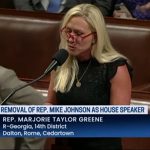
In 2007, railroad giant Norfolk Southern Corp. ” and watered down.
‘There’s Just Less Attention’
The Ohio disaster has led to renewed calls for stronger safety standards for trains transporting hazardous materials, nearly a billion tons of which travel by rail each year in the U.S.
In his letter to Norfolk Southern, Shapiro noted the company’s “well known opposition to modernized regulations” and said he has urged the Biden administration to reexamine what qualifies as a “high-hazard flammable train” and the need for more advanced safety equipment aboard such trains.
Ohio Gov. Mike DeWine (R) said it is “absurd” that the Norfolk Southern train didn’t meet the high-hazard classification.
Advertisement
Democrats and Republicans have both criticized Transportation Secretary Pete Buttigieg for his handling of the accident.
“We need Congressional inquiry and direct action from @PeteButtigieg to address this tragedy,” Rep. Ilhan Omar (D-Minn.) wrote in a Twitter post.
When Sen. Ted Cruz (R-Texas) responded that he “fully agreed,” Omar asked, “So do you support reinstating the rail safety rules that Trump repealed—while Norfolk Southern executives made millions and spent billions on stock buybacks— and expanding the safety rules to cover trains that carry these chemicals?”
Cruz did not respond.

Gene J. Puskar/Associated Press
Buttigieg finally weighed in on Monday, after 10 days of silence, writing that “I continue to be concerned about the impacts” of the derailment. He said DOT would look at the results of NSTB’s investigation, once final, and “use all relevant authorities to ensure accountability and continue to support safety.”
Advertisement
Asked if the Biden administration has considered restoring the Obama-era brake rule, a DOT spokesperson indicated the agency is handcuffed by legislation that Congress passed in 2015.
“Republicans in the House and Senate required a cost-benefit analysis that allowed the Trump administration to repeal the rule in 2017, which now makes it very challenging to reinstate the rule,” the DOT official wrote, adding that the Federal Railroad Association “is exploring the potential for usage of ECP brake equipment to improve railroad safety and braking performance, such as researching the potential development of other enabling technologies to support adoption.”
That mandated cost-benefit analysis ultimately concluded that the costs of the brake rule significantly outweighed the benefits — a finding that essentially forced Trump’s DOT to rescind the rule.
Ross Grooters, a longtime locomotive engineer and co-chair of Railroad Workers United, told HuffPost that deregulation is part of a larger systemic crisis in the industry. Major railroads, including Norfolk Southern, have adopted a cost-cutting strategy called “precision-scheduled railroading,” which involves reducing railroad employees and increasing the length of trains.
“It’s a perfect storm and there’s just less attention on the things that need to be paid attention to,” Grooters said.
Advertisement
The Government Accountability Office found that staffing at the nation’s seven largest freight rail companies decreased approximately 28% from 2011 to 2021. The Ohio train that derailed had 150 cars, spanned more than 1 mile and had a crew of three people. Freight rail crews have declined from as many as seven after World War II to typically just two today. And railroads have sought to reduce that to a single engineer.
Grooters is hopeful that the Ohio incident will result in necessary regulatory changes, but said workers have been trying unsuccessfully to draw attention to problems for years and that accidents like the one in Ohio are inevitable under current policies.
“It’s not a matter of if, but kind of when and where,” Grooters said. “I would still say that’s true after East Palestine. … Unless we get these changes, we’re going to see increased derailments.”
CORRECTION: This article previously contained errors about the characteristics and historical uses of vinyl chloride and phosgene.
Advertisement

